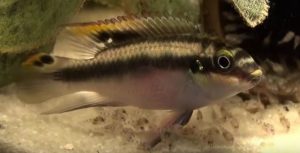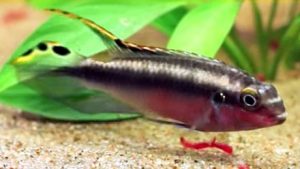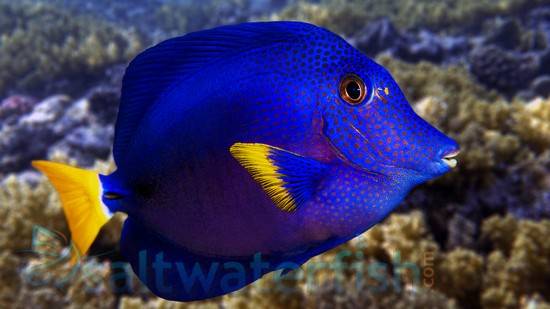The Kribensis Cichlid (Pelvicachromis pulcher) is a popular African cichlid that is endemic to Nigeria and Cameroon. It is also known to tropical fish keeping enthusiasts as kribensis, krib, common krib, red krib, super red krib, rainbow krib, rainbow cichlid, and purple cichlid.
The Kribensis Cichlid can be found in fast moving waters, but it is particularly fond of shallow, still, or very slow moving densely vegetated waters; and although theyare primarily a fresh water species, they are occasionally collected in brackish water. Kribensis are one of the easiest African cichlids to breed, which is undoubtedly why they are so popular with tropical fish keeping enthusiasts worldwide.
The Kribensis is a small “dwarf” cichlid which has an elongated body shape that is basically black in color, with a yellow lateral stripe over a dark longitudinal stripe that runs from the mouth to the caudal fin, and a red to pink belly which turns a vivid scarlet red during courtship and breeding. The dorsal and caudal fins of both sexes will often have one or more gold ringed eye spots or ocelli.
Mature males develop pointed dorsal, caudal, and anal fins, and are normally larger than the females. Females are always rounder bodied than males, develop a vivid red/purple belly during spawning, and have more rounded pelvic, dorsal, and anal fins. Albino tank raised specimens are relatively common, and both forms are readily available in the aquarium hobby. Juvenile specimens are monomorphic until about six months of age.
Although Kribensis Cichlids are highly recommended for community tanks, like all cichlids they can become extremely territorial during breeding. They are a shy, docile species that should not be housed with larger or more active tank mates. They are best kept in pairs with small tetras, barbs, danios, rasboras, Corydoras, gouramis, Loricariids, or other West African dwarf cichlids, provided enough space is given for them to form small territories.
Kribensis Cichlids are best kept in a densely planted 55 gallon or larger aquarium with a medium to fine gravel substrate, with plenty of rocks formed into caves, and some African Driftwood or bogwood for them to hide among and breed in. Because they are a cave spawning species, small clay flower pots are frequently used along with rock structured caves for breeding.
Much aquarium literature on Kribensis Cichlids suggests that they form monogamous pairs, however in their natural environment, Polygynous harems are common.
Kribensis are secretive cave spawners that also are known to lay their eggs in holes excavated underneath rocks or plants. In an aquarium environment, they readily accept clay flower pots or rock caves as breeding sites. They lay anywhere from 30 to over 100 adhesive eggs in rows on the ceiling of the cave. Although both parents care for the eggs until they hatch, usually within 21 to 28 days; the female will take over the care of the fry, while the male typically guards their territory. The fry can be fed baby brine shrimp and finely ground omnivore flakes until they are able to fend for themselves.
Although Kribensis Cichlids are categorized as omnivores, the primary diet in their natural environment is green algae, small diatoms, small pieces of plants, and blue green algae with only an occasional invert being consumed.
In an aquarium environment, they do well when placed on a diet of vegetable based foods. Spirulina flakes, a quality vegetable flake food, or African Cichlid micro pellets are a good choice for kribs with an occasional supplement of frozen or freeze dried brine shrimp, bloodworms
, etc.
Kribensis Cichlids are readily available online and from tropical fish shops throughout the country. They are sold when they attain a size of 1″ as juveniles, up to 4″ as adults.
Minimum Tank Size: 55 gallons
Care Level: Easy
Temperament: Semi aggressive
Aquarium Hardiness: Hardy
Water Conditions: 72-82° F, KH 3-10, pH 6.0-8.0
Max. Size: 4″
Color Form: Black, Red, Yellow
Diet: Omnivore
Compatibility: Peaceful community tanks
Origin: Nigeria and Cameroon, Africa
Family: Cichlidae
Lifespan: 5-8 years
Aquarist Experience Level: Beginner



